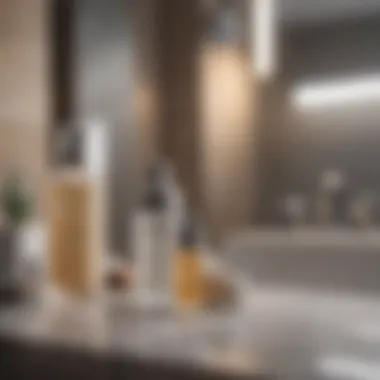Effective Strategies to Combat Butt Acne


Intro
Butt acne, while often considered a taboo topic, is a skin condition that can affect anyone. Understanding it requires a closer look at various factors that contribute to its emergence. This article serves to illuminate these factors and explore practical strategies for managing and preventing butt acne. By examining relevant lifestyle habits, nutrition choices, and skincare routines, readers can equip themselves with effective knowledge to promote skin health in this frequently overlooked area.
Wellness Insights
Benefits of Regular Exercise
Physical activity has profound effects on overall skin health. When you engage in regular exercise, blood circulation improves. This increased flow can help in the distribution of nutrients, making skin healthier. Additionally, sweating during exercise plays a role in flushing out toxins, which may contribute to acne development.
Moreover, exercise aids in stress reduction. Elevated stress levels can lead to hormonal imbalances, which might aggravate acne. Thus, incorporating a routine of physical activity can lead to clearer skin and improved mental well-being.
Understanding Mental Health
Mental health is an often neglected aspect of skin conditions. Anxiety or low self-esteem stemming from body image issues related to butt acne can perpetuate the cycle of breakouts. Establishing a routine that includes mindfulness practices, like meditation or yoga, can mitigate these effects.
By prioritizing mental health, individuals may find it easier to manage their skin condition. Understanding the mental connection to physical health emphasizes the importance of holistic approaches in tackling butt acne.
"The mind and body are interconnected, and addressing one often benefits the other."
Nutrition Information
Balanced Diet Essentials
Diet plays a critical role in maintaining skin health. A balanced diet rich in vitamins and minerals can alleviate skin issues. Foods high in omega-3 fatty acids, such as salmon and walnuts, to help reduce inflammation. Antioxidants found in fruits and vegetables can combat oxidative stress, promoting clearer skin.
Consider integrating zinc-rich foods, like chickpeas and pumpkin seeds, into your diet. Zinc is known for its role in skin repair and can be especially beneficial for acne-prone areas, including the buttocks.
Meal Planning and Preparation
Meal planning is an effective way to ensure a balanced intake of nutrients. Preparing meals in advance can help avoid impulsive eating habits, which often lead to unhealthy choices. Focus on whole foods that are minimally processed. Incorporating sufficient amounts of fiber can also aid digestion, which in turn supports skin health.
Ensure you drink adequate water throughout the day. Hydration is crucial for maintaining skin elasticity and clarity.
By following sound dietary practices, one can create an internal environment that fosters healthy skin, addressing butt acne from within.
Understanding Butt Acne
Butt acne, often an uncomfortable topic, requires a deeper look to fully grasp its implications. This section aims to shed light on this condition, which is frequently misunderstood or dismissed due to stigma. Though it primarily manifests on the buttocks, its causes and treatment are pertinent to a broader understanding of skin health. This leads to effective management and prevention strategies, which can significantly improve one’s comfort level and self-esteem.
Definition and Symptoms
Butt acne is primarily characterized as the presence of inflamed bumps, typically resembling standard acne lesions, on the skin of the buttocks. Symptoms can include redness, tenderness, and in some cases, pus formation in the acne spots. Unlike facial acne, butt acne may not always be obvious but can lead to group discomfort, especially when wearing tight clothing or swimming. Recognizing these symptoms early is crucial for appropriate treatment.
Causes of Butt Acne
The underlying causes of butt acne are multifaceted. Understanding these can provide insights into effective management.
Friction and Sweat
Friction and sweat are significant contributors to the development of butt acne. When tight clothing is worn during physical activities, friction can create irritation on the skin. As the body sweats, the sweat can then mix with bacteria and dead skin cells, blocking pores and fostering the growth of acne. This aspect is key because individuals engaged in regular physical exercise may be especially vulnerable to this skin issue. Therefore, maintaining a balance between activity and appropriate clothing can mitigate the risk.
Poor Hygiene
Poor hygiene plays a pivotal role in exacerbating butt acne. Neglecting regular bathing can lead to a build-up of oil and dead cells. This accumulation can ultimately clog pores, resulting in acne formation. While establishing an effective hygiene routine can seem simplistic, its importance cannot be overstated. Individuals should prioritize cleansing the area regularly, especially post-exercise.
Hormonal Changes
Hormonal changes, often related to puberty, menstruation, or other life stages, can affect skin health considerably. Fluctuations in hormones can lead to increased oil production, resulting in more acne formation. This relationship makes understanding one's hormonal cycle even more pertinent in managing not just butt acne, but overall skin health as well. Awareness of hormonal influences aids in planning preventative strategies.
Dietary Factors


Dietary factors, including sugar and processed foods, can also contribute to skin health. A diet high in sugars may promote inflammation and lead to breakouts. Incorporating a nutrient-rich diet, rich in vitamins and minerals, supports skin integrity. Making dietary modifications can often serve as a proactive measure to improve skin conditions, including acne on the buttocks. Focusing on whole foods rather than processed options can yield beneficial results.
Genetic Predisposition
Finally, genetic predisposition cannot be overlooked. Individuals with a family history of acne are likely to be more susceptible. Recognizing this aspect can prompt proactive measures and encourage open discussions about skin care practices among family members. While genetics plays a role, understanding personal risk can guide individuals towards advanced preventative strategies and care routines.
Prevention Strategies
Prevention strategies play a crucial role in managing butt acne. Employing effective preventative measures can significantly reduce the occurrence of this condition, making it essential for individuals who struggle with it. By focusing on specific lifestyle choices and habits, one can effectively mitigate the risk factors associated with butt acne. Understanding and adhering to preventative strategies helps not just with physical appearance but also contributes to overall skin health and self-confidence.
Dietary Adjustments
Importance of Hydration
Hydration is vital for maintaining healthy skin, including areas often impacted by acne. Adequate water intake helps to flush out toxins from the body and maintain skin elasticity. A significant characteristic of hydration is its ability to support bodily functions, thereby promoting a clearer complexion. More hydration may lead to less oily skin, indirectly reducing the likelihood of acne outbreaks. It is valuable because it is simple to implement and does not require any special products.
Nutrient-Rich Foods
Incorporating nutrient-rich foods into one's diet can aid in combating butt acne. Foods that are high in vitamins A, C, and E, as well as omega-3 fatty acids, contribute positively to skin health. The key characteristic of such foods is their ability to nourish the skin from within. They are seen as beneficial because they reduce inflammation and promote healing. Including these foods can be a straightforward way to improve dietary habits and skin condition simultaneously.
Avoiding Processed Sugars
Processed sugars can exacerbate acne issues, including butt acne. These sugars lead to spikes in insulin levels, which can trigger increased oil production and inflammation. The primary characteristic of avoiding processed sugars is the reduction of inflammatory effects on the skin. This choice is significant because it highlights how dietary choices directly impact skin health. Reducing sugar intake can be challenging; however, the benefits for skin clarity can be substantial.
Skincare Regimen
Choosing the Right Cleanser
Selecting an appropriate cleanser specifically for the buttocks area is fundamental for preventing acne. A gentle but effective cleanser can help remove bacteria and excess oils without stripping the skin. Choosing a cleanser with salicylic acid or benzoyl peroxide can be very beneficial due to their acne-fighting properties. Its unique feature lies in its dual action of cleaning and treating the skin simultaneously. Selecting the right product can impact individuals' skin health significantly.
Exfoliation Techniques
Exfoliating the skin is essential in preventing butt acne. Removing dead skin cells helps avoid clogged pores, which are a primary cause of acne. Chemical exfoliants, such as glycolic acid, may be more effective than physical scrubs. The key characteristic of exfoliation is its ability to promote skin renewal. Adopting this technique regularly can help maintain smooth skin and prevent breakouts effectively. As with any skincare method, one must be careful not to over-exfoliate, which can lead to irritation.
Moisturizing Effectively
Moisturizing the buttocks area is crucial, even for those with oily skin types. The choice of moisturizer should be non-comedogenic, meaning it does not clog pores. A good moisturizer keeps the skin hydrated and helps maintain its barrier function. This practice is essential as it prevents excess oil production that can lead to acne. The unique feature of effective moisturizers lies in their ability to retain moisture without contributing to breakouts. Finding the right balance in skincare can lead to clearer skin overall.
Appropriate Clothing Choices
Opting for Breathable Fabrics
Wearing breathable fabrics is one way to prevent butt acne. Materials such as cotton allow for better air circulation and can reduce sweating. The key characteristic of breathable fabrics is their ability to wick moisture away from the skin. This choice is advantageous because it lowers the risk of bacterial growth in warm, humid environments. Individuals can benefit from incorporating more breathable clothing into their wardrobe, especially during warmer seasons.
Avoiding Tight Clothing
Tight clothing restricts airflow and can trap moisture against the skin, leading to acne formation. The primary characteristic of choosing looser clothing is improved ventilation, which reduces irritation and breakouts. This preventative measure is important because it highlights how clothing choices impact skin health. By opting for looser fitting options, individuals may notice an improvement in the skin's condition over time.
Importance of Regular Laundry
Regularly washing clothing is essential to prevent butt acne. Accumulated sweat and bacteria on clothes can exacerbate skin issues. The key aspect of this practice is hygiene; it maintains cleanliness in clothes that come in contact with the skin. This is a straightforward strategy that can make a significant difference in skin health. Developing a routine for laundry will contribute to a cleaner environment that fosters clearer skin.
Treatment Options
Treatment options for butt acne are essential to understand as they provide effective methods to address this common skin condition. Each approach varies in its mechanism and target outcomes. Adopting suitable treatment strategies can significantly enhance the quality of skin health and overall well being. This section will explore the topical treatments, oral medications, and natural remedies available for butt acne, examining their benefits and pertinent considerations.
Topical Treatments
Topical treatments play a vital role in managing and alleviating butt acne. These treatments are often the first line of defense. They target acne directly at the skin's surface, offering immediate aid to affected areas.
Benzoyl Peroxide


Benzoyl peroxide is a well-known topical agent effective in reducing acne lesions. Its key characteristic is its antibacterial property, which helps in reducing the presence of acne-causing bacteria on the skin. The use of benzoyl peroxide in treating butt acne has gained popularity due to its efficacy.
One unique feature of benzoyl peroxide is its dual activity. It not only tackles bacteria but also acts as a gentle exfoliant, aiding in the unclogging of pores. This can be particularly beneficial for individuals prone to breakouts in this area. However, it is essential to note that benzoyl peroxide can lead to dryness or irritation, especially for those with sensitive skin, so careful application is advised.
Salicylic Acid
Salicylic acid is another essential topical treatment used to combat butt acne. Its primary role is to exfoliate and unclog pores, making it invaluable for treating and preventing acne. Salicylic acid's key characteristic is its ability to penetrate deep into the skin, addressing underlying issues that may lead to outbreaks.
A unique aspect of salicylic acid is its anti-inflammatory properties, which help reduce redness and swelling associated with breakouts. This makes it a popular choice among skincare enthusiasts. The downside of salicylic acid is that, like benzoyl peroxide, it can cause dryness or peeling. Proper moisturizing should follow its application to minimize these effects.
Retinoids
Retinoids are a potent class of topical treatments derived from vitamin A. They contribute significantly to acne treatment by promoting cell turnover and preventing clogged pores. The key characteristic of retinoids is their ability to enhance skin texture over time, leading to smoother skin overall.
Retinoids stand out because they also address hyperpigmentation, a common issue following acne lesions. However, new users should be cautious; retinoids can cause initial irritation or redness as the skin adjusts. Thus, gradual introduction into a skincare routine is advisable for best results.
Oral Medications
In cases where topical treatments do not suffice, healthcare professionals may prescribe oral medications. These can provide systemic relief for acne, addressing underlying hormonal or bacterial factors contributing to breakouts.
Antibiotics
Antibiotics are used to reduce bacteria and inflammation caused by acne. They are a thoughtful choice when bacterial involvement is significant. Antibiotics work by lowering the number of acne-causing bacteria on the skin, thus leading to a decrease in inflammation. The unique feature of antibiotics is their ability to provide swift results, particularly for inflammatory acne.
However, prolonged use warrants caution. Some individuals may experience side effects or develop antibiotic resistance over time. Consulting with a healthcare provider for the appropriate type and duration of use is crucial.
Hormonal Treatments
Hormonal treatments can be beneficial for those whose acne is influenced by hormonal fluctuations. This approach focuses on regulating hormones that may trigger acne formation. Hormonal treatments, such as oral contraceptives, can help balance hormones and reduce acne occurrences.
They are particularly valuable for women who experience breakouts related to their menstrual cycles. The downside is that hormonal medications may have side effects, such as mood changes or weight gain, necessitating a careful discussion with a healthcare provider before starting.
Natural Remedies
Natural remedies are appealing due to their holistic approach and fewer side effects. Many individuals prefer them alongside or instead of traditional treatments. They can provide soothing effects and mitigate the severity of butt acne without harsh chemicals.
Tea Tree Oil
Tea tree oil is renowned for its antimicrobial properties. It can be effective in treating butt acne by reducing inflammation and promoting healing. Its key characteristic is its natural composition, making it a preferred choice for those seeking less invasive solutions.
One unique feature of tea tree oil is that it can be used in various formulations, such as gels or creams, allowing for flexibility in application. However, tea tree oil should be used cautiously, as it can cause irritation for some, suggesting a patch test is advisable before widespread use.
Aloe Vera
Aloe vera is another natural remedy celebrated for its soothing and healing properties. It contributes to butt acne treatment by reducing redness and inflammation while providing hydration. The key characteristic of aloe vera is its ability to calm irritated skin, enhancing recovery.
A distinct benefit of aloe vera is that it is safe for most skin types, with minimal risk of irritation. This makes it suitable for regular use as part of a skincare routine. However, its effectiveness may be slower compared to more potent treatments, requiring consistent application to see results.
Apple Cider Vinegar
Apple cider vinegar has grown in popularity as a natural acne treatment. It possesses mild astringent properties that can help balance skin pH levels and minimize oiliness, an essential contributor to acne formation. The key characteristic of apple cider vinegar is its versatility, allowing it to be used in various ways, such as diluted wash or toner.
One specific advantage is its affordability and accessibility. However, using apple cider vinegar undiluted can cause skin irritation. Therefore, it is crucial to dilute it properly before applying it to the skin.
Consistent application of suitable treatment options, either through topical solutions, oral medications, or natural remedies can lead to improved skin condition and enhanced confidence. Understanding the benefits and limitations of each choice allows for informed decisions in managing butt acne effectively.
When to Seek Professional Help
Understanding the right moment to seek professional help is essential for anyone dealing with butt acne. While many cases can be managed at home through proper skincare and lifestyle changes, there are instances where the condition may require the expertise of a dermatologist. Professional guidance not only offers a more targeted treatment approach but also ensures that any underlying issues are addressed effectively.
Identifying Severe Cases


Severe cases of butt acne can manifest in various ways. Common signs that require a more serious examination include:
- Persistent Pimples: If you notice that acne persists despite regular treatments and lifestyle modifications, it may indicate a more entrenched issue.
- Pain and Discomfort: Acne that causes significant pain or discomfort should be evaluated to alleviate symptoms and prevent further complications.
- Scarring Potential: If lesions are deep and likely to cause scarring, it’s wise to consult a professional before attempting aggressive home remedies.
- Signs of Infection: Symptoms such as increased redness, warmth, or pus indicate a possible infection, which warrants immediate attention.
Identifying these signs early can lead to better management and minimize potential long-term impacts on skin health.
Consultation with a Dermatologist
Visiting a dermatologist can provide several benefits when dealing with butt acne. Here are some important considerations:
- Accurate Diagnosis: A dermatologist can help differentiate between butt acne and other skin conditions, such as folliculitis or eczema, ensuring the right treatment plan is implemented.
- Customized Treatment Plans: Professionals can prescribe medications specifically tailored to the individual’s skin type and severity of the condition. This may include topical treatments or oral medications for more widespread cases.
- Advanced Treatment Options: If over-the-counter products prove ineffective, dermatologists can offer advanced solutions such as chemical peels, laser therapy, or other procedures that may yield better results.
- Monitoring Progress: Regular check-ups allow dermatologists to monitor treatment effectiveness and make adjustments as needed, improving outcomes and skin health.
Seeking professional help can be crucial for effective and safe treatment of butt acne, helping to restore confidence and skin clarity.
In summary, understanding when to seek professional help can significantly enhance the management of butt acne. Recognizing severe cases and consulting with a dermatologist ensures that individuals receive appropriate and effective care.
Long-Term Skin Health
Maintaining long-term skin health is essential for preventing butt acne and ensuring overall well-being. Skin is the body's largest organ, and its condition reflects both internal health and external care. Proper skin health leads to better appearances and increases confidence. Understanding how lifestyle choices impact skin quality is crucial for effective management of acne.
Maintaining a Balanced Diet
A balanced diet plays a key role in skin health. Consuming a variety of nutrient-rich foods helps provide the vitamins and minerals needed for skin repair and regeneration. Nutrients like vitamin A, vitamin E, and zinc are particularly beneficial for maintaining skin integrity.
- Hydration is Crucial: Drinking adequate water helps in flushing toxins from the body, keeping skin hydrated and reducing the chances of clogged pores that can lead to butt acne.
- Focus on Whole Foods: Include more fruits and vegetables, lean proteins, and whole grains into your diet. These foods supply antioxidants that protect skin from damage and inflammation.
- Limit Processed Foods: High-sugar and high-fat diets can exacerbate acne. Avoiding these can aid in maintaining clearer skin.
Regular Exercise and Its Benefits
Exercise serves not only physical but also mental benefits that contribute to skin health. Regular physical activity promotes blood circulation, which aids in nutrient delivery and supports skin rejuvenation. Here are key points related to exercise:
- Sweating is Beneficial: Sweating helps cleanse pores, removing dirt and bacteria that can cause acne. However, it is essential to shower soon after exercising to prevent sweat from clogging pores.
- Stress Reduction: Exercise is known to reduce stress levels, which can lead to hormonal fluctuations and, subsequently, skin issues. Managing stress through physical activity can help maintain smooth skin.
Skincare Consistency
Consistency in skincare routines is vital for maintaining skin health over time. A proactive approach to skincare can help mitigate flare-ups of butt acne. Following a structured routine can reinforce skin's defense against breakouts.
- Cleansing and Exfoliation: Using gentle cleansers regularly can help remove dead skin cells and impurities. Exfoliation should be done a few times a week to promote skin renewal.
- Moisturizing: Adequate hydration through suitable moisturizers keeps skin barrier intact, preventing dryness and irritation that can lead to acne.
Maintaining a regular routine not only accentuates clear skin but also creates a habit that is beneficial for long-term skin health.
In summary, prioritizing diet, exercise, and a consistent skincare routine forms the cornerstone of long-term skin health. Implementing these strategies helps reduce the risk of butt acne and enhances overall skin quality.
Debunking Myths About Butt Acne
Addressing the myths surrounding butt acne is crucial for fostering a clearer understanding of this common issue. Many misconceptions can lead to incorrect approaches to treatment and prevention, which may exacerbate the problem rather than resolve it. Understanding these myths can facilitate better management strategies and empower individuals to take charge of their skin health.
Common Misconceptions
There are several widespread misconceptions about butt acne that need clarification. One prevalent myth is that butt acne only affects teenagers or young adults. In fact, butt acne can affect individuals of any age. Factors that contribute to butt acne include hormonal fluctuations, dietary choices, and hygiene practices, all of which are not limited to youth.
Another misconception is that butt acne is solely caused by poor hygiene. While inadequate cleanliness can exacerbate acne, the condition often stems from several factors such as friction from clothing, excess sweat, and even genetics. Regular washing can help, but further insight into external factors is necessary for effective management.
Furthermore, some people believe that certain products or treatments for facial acne are equally effective for targeting butt acne. This is untrue. The skin on the buttocks is different in composition, and treatments need to be tailored specifically for that area to achieve effective results.
The Role of Sexual Activity
Many people think that butt acne is directly linked to sexual activity, implying that sexual hygiene directly affects skin health in this area. While it’s true that maintaining personal hygiene is important, butt acne does not discriminate based on sexual behaviour. Factors like sweating and friction caused by clothing tend to play larger roles in the formation of acne.
Moreover, the myth that engaging in sexual activity can directly lead to butt acne distracts from addressing the real causes. Factors such as hormonal changes that may arise during sexual maturity or other lifestyle choices should be recognized, not misattributed to sexual activity itself.
The End
In summary, butt acne is not just a trivial matter but a condition that deserves attention and management. Understanding its causes, prevention, and treatments can lead to significant improvements in skin health. This article has explored various facets of eliminating butt acne, providing readers with actionable insights for their skincare routines.
Summary of Key Points
The major highlights include the importance of maintaining proper hygiene, being mindful of clothing choices, and recognizing dietary impacts on skin health. The article has also emphasized the role of a consistent skincare regimen. Treatment options range from topical treatments like benzoyl peroxide and salicylic acid to natural remedies such as tea tree oil and aloe vera. Moreover, understanding when to seek professional help is crucial in managing more severe cases effectively.
Encouragement for Proactive Management



